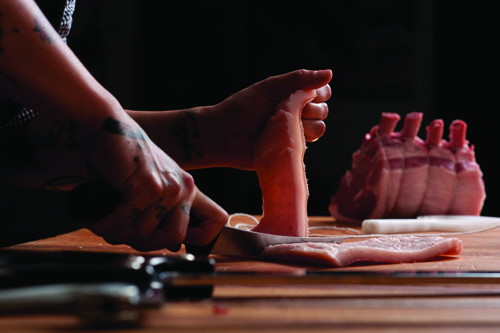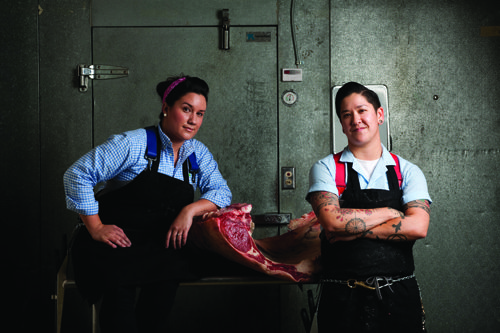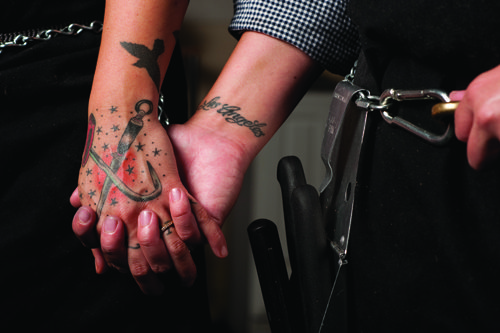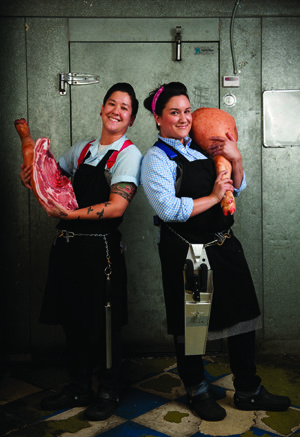We chop it up with the lesbian couple behind L.A.’s hot new sustainable butcher shop.
Whether you’re a conscious carnivore or an omnivore with a dilemma, the politics of meat can be a sticky business—but lesbian butchers and real-life partners Amelia Posada and Erika Nakamura may have the ethical solution that you’ve been hungering for in their sustainable, locally sourced L.A. butcher shop, Lindy & Grundy.
How did you meet?
Nakamura: She happened to be helping a friend of hers who owns a café throw this event it was like a drag show that I had some [drag kings] friends involved with it. After…she found me on MySpace a couple months later and I had just rode the New York city century bike tour and so there was a photograph of [me] fixing a flat. And so she wrote me this long email about how she looking for a bicycle.
Posada: Which was so not true. [Laughs] My only interest was in Erica.
Nakamura: But it started off this incredible correspondence that we ended up developing so it was like this wonderful flirtation all trough email. [Laughs]
What is a sustainable butcher shop?
Nakamura: It’s about generating as very little waste as possible. We really try to use everything we can and so when you’re actually eating a chicken then you take the chicken bones and make stock out of it. When you do that at home, you start to realize, hey you can really apply this to a business model and create more products as a result.
Posada: All of the products that we carry in our shop are from 150 miles of Los Angeles, so the pickles that we use are going to be made by a local pickle maker. Everything in our shop is very, very local and is seasonal. Everything is just literally made with love by people like us who had a dream and are trying to make money off of their dream.

How do you want to change they way people eat?
Posada: We’re the only butcher shop in Southern California that gets in entirely whole animal carcasses. Most people these days get their meat in a box, and so by us getting in whole carcasses, we want to utilize the whole animal. We want to try to move people away from the tenderloin, away from boneless skinless chicken breast and encourage them to eat the rest of the animal, which is also delicious and can be more economical. We give them recipe suggestions so they will feel comfortable branching away from all the common cuts that you can see in the grocery store.
What response have you received from the lesbian vegetarian community?
Posada: I’m so happy to have an articulate dialog with somebody about food politics as a conscious carnivore. I love to sit down and talk to people about their concerns as a vegetarian, as a vegan. As the conversation starts to become rude or accusatory it’s just not helpful for anybody…everybody needs to respect each other’s food politics…I’ve had vegetarians kind of scoff at what I do and then I look at their feet and they’re wearing leather shoes, or carrying a leather handbag. We all pick and choose our battles and my response is that choosing to not eat meat is a first world privilege. Once you acknowledge that, I think people really need to put themselves in check…because most people in the world don’t have that option.
What about the environmental concerns over meat production?
Nakamura: I think that the environmental impact that many people refer to are these kind of factories, farming, feed lots where there are all these animals that are crammed in together and there’s all this methane production as a result of it and it really is absolutely heinous how that happens. The kind of farms that we support are small family farms.

What are the misconceptions about butchering?
Nakamura: The number one thing that always blows my mind is that people think that I’m a slaughterer because I’m a butcher. They’re like, Oh my gosh, you kill things? And I’m like, Oh you guys, I wouldn’t think of killing a fly. That’s how we both are. [But] I think the biggest misconceptions really are that it’s really bloody and really kind of pretty grotesque and it’s actually not like that at all…there’s a really intricate craft involved.
Amelia, can you tell me about your introduction to butchering?
Posada: My background is in floral and event design, I’m a super high-femme girlie-girl. So I’m not exactly what people would imagine when they think of a butcher. My first day [interning at Fleischer’s Grass-fed & Organic meats]…they were like OK we need to take a different approach. So Hans Sebold, who’s a master butcher from Bavaria, he took me to Wal-Mart [meat section]…it’s all sitting in Styrofoam wrapped in plastic and it’s coming from who knows where. He spent three hours going over the commodity meat and factory farming and big agriculture and showing me all the quote unquote ingredients that are in meat—there should never be ingredients in meat. I was horrified; I mean I was living Food, Inc. And that was it. I wasn’t grossed out anymore. What’s gross is the fact that some people can only afford to feed their families meat that has been pumped with stuff that’s hurting them.

What’s the benefit of going to a butcher shop over a grocery store?
Posada: At Lindy & Grundy’s Meat, our stuff is 100 percent traceable. We’re totally transparent about what we do. We personally know all of our ranchers and we have personally visited all of our ranches many, many times. You’re not going to get that at Whole Foods. You’re not going to get that at any grocery store in the country that is corporate. It’s just impossible.
Do you have advice for people outside of L.A. to eat more sustainably?
Nakamura: I think the number one thing people could start to do is to start eating locally. Really looking around and seeing who’s in your community and what are they doing. Maybe not shop so much at bigger supermarkets and really go to your neighborhood farmer’s market. I think if people…give them their money instead of these bigger corporations, I think that really does make a difference in the long run.
Where does the name Lindy & Grundy come from?
Posada: Those are actually our nicknames that our family and friends call us.
Nakamura: A lot people they walk into a butcher shop and they expect to see some big guy in an apron who’s like, Whadda ya want? And so when you go walking into Lindy & Grundy, you’re not seeing those people. You’re seeing 5-foot tall, little lesbians who are like working away. (lindyandgrundy.com)
